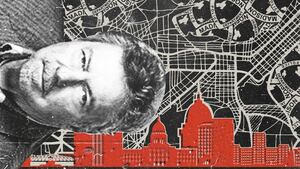Lauren Gibson was in a caravan of friends heading from their camping spot in Panguitch, Utah, back to California last week when one of the cars was pulled over for speeding. The stop took place near a gas station in the small town of less than 2,000 people.
Before the day was over, the 19-year-old was on her way to facing hate-crime charges in what critics describe as one of the more absurd examples yet of aggrieved cops unduly likening themselves to marginalized minority groups in a country rife with hate crimes.
Gibson said the Garfield County Sheriff’s Deputy who pulled over her friend's car was aggressive and eventually wrote her friend a ticket for speeding. After watching the interaction, she said, she was upset and picked up a rusted “Back the Blue” sign that she said her friends had found on the side of the road and kept in one of the cars. (The deputy would later suspect that it had been stolen from the gas station and even went inside to check, but learned it had not been.)
After the deputy finished writing his ticket, she told The Daily Beast, she waved the sign at the officer, stepped on it, and threw it in the trash.
Gibson, a California college student, said she wouldn’t describe herself as “anti-police,” even though she does believe some tend to abuse their power. The display of emotion, she said, was due to her anger over how her friend was treated and the effect the traffic stop seemed to have on her.
“I just wanted to, I don’t know, make her feel better or something or stand up for her,” Gibson told The Daily Beast.
Instead, Gibson was arrested by a sheriff’s deputy and charged with disorderly conduct and criminal mischief with a hate-crime enhancement for her attempt to “intimidate law enforcement,” according to a probable-cause affidavit obtained by The Daily Beast.
The charge was a shock to Gibson. And hate-crime experts familiar with Utah’s laws say they also believe it is a stretch at best.
“This doesn’t really seem to meet the criteria for what we would generally consider a hate crime, nor the specific language of the statute,” said Seth Brysk, a Utah regional director with the Anti-Defamation League.
The Garland County Sheriff’s Office did not respond to repeated requests for comment on Gibson’s arrest. The Garfield County Attorney’s Office also did not respond to repeated requests about whether and how Gibson would be prosecuted on the charges she faces.
In the affidavit, the responding deputy reported that Gibson stomped on the “Back the Blue” sign, crumbled it up “in a destructive manner” and threw it into a trash can—“all while smirking in an intimidating manner.”
But Brysk, who helped advocate for Utah’s hate-crime enhancements, which passed into law in 2019, said the key phrase there is “intimidate”—which is language included in the statute. While the model hate-crime statute that the ADL drafted for Utah was meant to protect victims of certain races, religion, or sexual orientations, he said the version that eventually passed in Utah also applies that protected status to law-enforcement officers. Louisiana passed a similar addition to their hate crime statute in 2016, at a time when, as now, protests against police violence were visible in the state and nationally.
Although he believes that addition was “unnecessary” given that there are already harsher laws on the books for people who attack law-enforcement officers, Brysk said, he does believe there are instances where someone may be seeking to terrorize or intimidate cops writ large.
According to a report by the National Law Enforcement Memorial and Museum, at least 264 cops were killed in 2020, a 96 percent increase from 2019 that was largely due to COVID. Nonetheless, the report claimed that at least six deaths were the result of an “ambush” attack on officers.
Still, Brysk added, a 19-year-old college student roughing up a sign and smirking doesn’t strike him as one of those instances. “That’s not the intention and that’s not what’s going on here,” he told The Daily Beast.
Brian Levin, a professor of criminal justice and director of the Center for the Study of Hate and Extremism at California State University, San Bernardino, said he could see how Utah’s law might “at its greatest elastic stretch” allow for a “misapplication” of the statute in the case of Gibson. But he was doubtful her case would go very far. “I think any decent prosecutor would decline the charges,” he said.
Of course, that might not be the case in Garfield County, where just last year, a man was arrested, charged, and convicted in a strikingly similar incident.
In August 2020, Joseph Dawson, 32, was arrested by Garfield County Sheriff’s Office deputies after pulling down a similar “Back the Blue” sign at an Escalante, Utah, gas station. He spray-painted it with pink letters, replacing the word blue with “bisexual,” according to a probable-cause affidavit obtained by The Daily Beast.
A man near the gas station reportedly confronted Dawson, ripped the sign down, and wiped paint on Dawson’s head before he was able to drive off. Dawson—who did not respond to a request for comment—was later found by deputies at a hiking trailhead and gave a “long explanation” of why he defaced the sign, “but the explanation wasn’t clear,” according to the affidavit. He was arrested and, after the Sheriff’s Office appealed to the Utah Attorney General’s Office, charged with a hate crime.
In December, Dawson was found guilty, according to court records, and was sentenced to two days in jail and a year of probation. The Utah Attorney General’s Office did not respond to a request for comment.
Gibson said she started to glean the gist about Dawson’s case from the deputy who arrested her last week. “He told me, ‘Do you want to know what happened to the last person that got arrested for this?’” she said. “He was kind of threatening me in that way.”
Gibson said she spent one night in jail after her arrest and has not yet filed a plea. She faces up to a year in prison, but she hopes to get things resolved with the prosecutor’s office.
“I don’t feel like I did anything wrong,” she said, adding that she does not believe that her actions justify a hate-crime charge in a country where horrific attacks on racial and religious minorities have been inescapable in recent years.
“If it was a dentist’s sign or something and I just crushed a dentist sign or something in front of them, like, nothing would have happened,” she said. “It’s the same thing. it’s just an occupation.”






